Akbar Allahabadi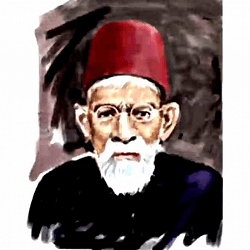
IntroductionAkbar Allahabadi was one of Urdu poetry's most outspoken poets. His poems are an accurate portrayal of his time, providing a thorough picture of all the moral, cultural, political, and psychological attitudes of the residents of Northern India. His poetry is a synthesis of classical, modern, inventive, and rigorous creative impulses. Despite being a traditionalist, Akbar was a reformer and a revolutionist. Commoners and intellectuals alike acknowledged him as a notable poet of his time. According to Shams-Ur-Rehman Farooqi Akbar Allahabadi uses the most Urdu words in his speech after Mir Taqi Mir. Childhood and EducationSyed Akbar Hussain Allahabadi was born on November 16, 1846, in the Allahabad district of Qasba Bara. Naib Tehsildar Tafazzul Hussain was his father. Akbar had his early education at home; he was able to read textbooks in Persian and Arabic when he was eight or nine years old and was thereafter admitted to the Mission School. 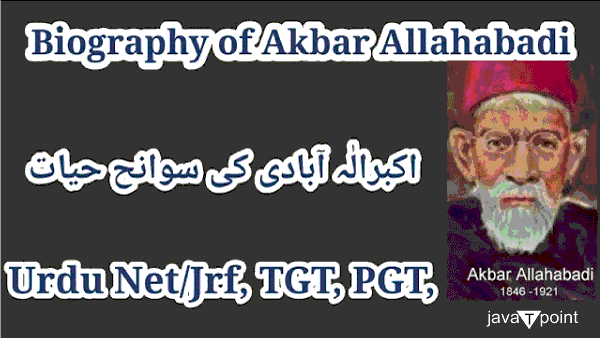
But at the age of fifteen, he was forced to drop out of school and look for work because of his family's dire financial position. For a couple of days, Akbar earned Rs. 20 per month working for a railway contractor. He worked on his English during this period, and in 1867, he passed the bar exam. Before becoming a litigator for the High Court, he practiced law for three years. During this time, he thoroughly observed judges, solicitors, and court proceedings. He succeeded in the High Court Advocacy Examination in 1873 and received his appointment as a judge quickly. MarriageAt the age of 15, Akbar's parents asked him to get married for the first time. His wife, who was four years older, was named Khadija Khatun. Despite having two sons-Nazir Husain and Abid Husain-with Khadija, this marriage did not work out, and Akbar wasn't happy with it. After divorcing his wife, Akbar didn't pay much attention to these three, and they had to make do with alimony payments of forty rupees each month. Due to the lack of support from their father, both of these sons struggled in life, and little is known about them. Akbar experienced a happier and more prosperous life after his second marriage to Fatima Sughra. Ishrat Husain and Hashim Husain were their two sons. PoetryBecause of Akbar Allahabadi's long and early efforts for Urdu, his poetry has a unique place in the Urdu language. His poetry encourages readers to reflect on and assess the socioeconomic conditions of his time. He engaged the readers in his reasoning by using humor. To grab the audience's attention, humor is essential. Akbar Allahabadi is a poet whose sense of humor educates people about the logic of various societal situations. Akbar Allahabadi is an Urdu writer who was born and died before Hindustan was partitioned. However, his writing in Urdu continues to be of immeasurable value. Young writers can find inspiration in his work to improve their writing skills. Since there were no modern educational institutions in existence during his period, he received his early education from a religious madrassah. It would be wrong to judge both Akbar's poetic ability and Urdu poetry by assuming that his poetry is only humorous. No contemporary poet, including Ghazal, Rubai, or Qita, has produced a more exquisite body of work than Akbar. He infused traditional poetry with modern elements. He would incorporate various genres and styles into a single poem. Additionally, he experimented with blank verse and produced superior autonomous poems compared to other poets of his era. In this sense, his poem "Ek Kida" is a real masterpiece. Akbar was the first poet to use regular nouns like camel, cow, sheik, mirza, engine, etc., in symbolic ways, opening the door for symbolic poetry in Urdu. His writing is full of originality of thought, wit, and eloquence for individuals with literary interests. He revealed the genuine faces of politicians as well. Unlike the conventional Urdu poetry lovers, Akbar is the first poet to fully capture the essence of a woman, sometimes in the shape of Nazneenan-e-Firang and other times in the form of a theatre actor. He is a model of hilarious Urdu poetry and caustic writing. Akbar is regarded as the greatest writer of satire and humor in Urdu poetry, as his humor is more than merely amusing; it has broader undertones. Akbar's keen observations noted the world's rapid change as well as the emergence of new classes. As Westernism became more and more prevalent, people started to look down on their Indian values. 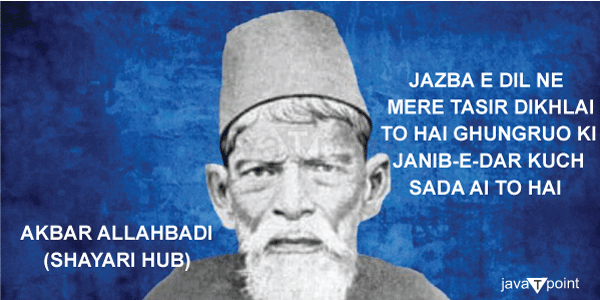
He developed a style in which there is external satire and humor but internal counsel and criticism to devote his poetry to the service of his land and nation. Nobody is specifically targeted by Akbar's satire. Everyone laughs because they think satire is mocking someone else, but upon mature contemplation, one realizes that Akbar was speaking to each of us. Akbar has worked very hard to raise awareness of the problem. He did set the path for poets that came after him. The significance of his poetry much outweighs the merits and subtleties of his skill. Notable Works of Akbar AllahabadiThere are numerous collections of poems and other writings by Akbar Allahabadi. The following are some of his best-known works- 1. Kulliyat Akbar Allahabadi First of all, "Kulliyats" is regarded as his most illustrious composition. The term "Kulliyat" refers to a collection of poems. In 1948, his fourth volume of Kulliyat was released. 2. Hungama Hai Kyun Barpa The second outstanding poem is titled "Hungama Hai Kyun Barpa, Thori Si Jo Pi Li Hai." Ghulam Ali, a legendary singer in modern-day Pakistan, also performs this ghazal. He also contributed verses to the well-known qawwali "Tum ik Gorakh Dhanda Ho" by Nusrat Fateh Ali Khan. 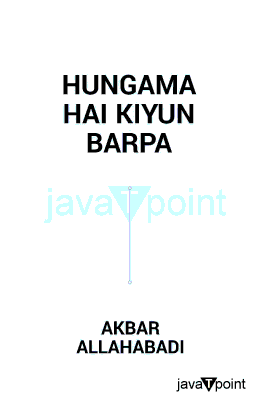
The 2015 Hindi movie Masaan featured several poems by Akbar Allahabadi. Varun Grover, who wrote the film's songs, claimed that he did this as an intentional homage by making one of the female heroines, Shaalu (played by Shweta Tripathi), appear to like reading Hindi poetry and Shayri. AnalysisAkbar Allahabadi (1846-1921), a well-known Urdu poet, was recognized for his scathing critique of the colonial authorities. He foresaw the negative effects that the overabundance of British products in Indian markets would have on the country's economy, society, and morals. He claimed that this was undermining the nation's customs and cultures in addition to hurting the economy and turning it into a "Godown for Europe." He also used his razor-sharp wit to criticize people who sow discord in their communities, saying that doing so only aided the British and led to fighting between brothers. Allahabadi wrote the satirical poetry "Jalwa-e-Darbar-e-Dehli" in response to the Delhi Durbar held in 1911 to commemorate King George V's coronation, which mockingly depicted the luxury and opulence of the foreign rulers. He criticized the Indians who remained loyal to the harsh government to go up the ranks. Akbar Allahabadi was a huge admirer of Gandhiji and dedicated a poem to him called Gandhi Nama. Though he acknowledged the Non-Cooperation Movement's successes, he also aimed to warn Indians about the threat posed by the English: "No matter how loud you yell "Jai," spin the wheel. Keep in mind that Sahib won't flee". Akbar Allahabadi made a vital contribution to the literary fight against colonialism by revealing the true nature of the imperialist regime through his quick wit and acute penmanship. After retiring from government service in 1903, the poet settled in Allahabad. His home, which was located behind Chowk Kotwali, is now an Inter College. In Allahabad's Khuldabad cemetery, Akbar is interred. He was given the title of Khan Bahadur by the colonial authority after rising from the position of railway clerk to that of sessions judge. He authored numerous poems cautioning Indians against the dangers of Western culture and was a harsh opponent of the colonial government's "civilization mission." Although he did not publish them, he wrote a collection of poems titled Gandhinama that expressed his deep admiration for Gandhi. With a scholarly introduction written by Professor Naimur Rahman, who holds the chair of Persian Studies at the University of Allahabad, the work was eventually published in 1948. 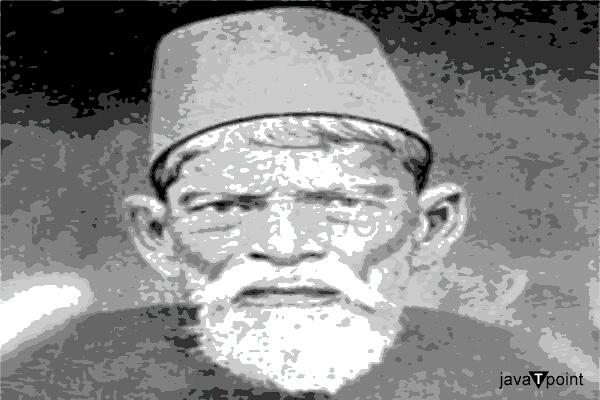
By coincidence, the poet's passing has been commemorated for 101 years as of 2022. At conferences in Allahabad and other literary venues, the centenary of the poet was honored. However, these tributes to Akbar's accomplishments failed to spark any discussion on social media or raise awareness of the poet's incisive satire and beautiful ghazals. Akbar's name instead gained attention when it was revealed that his pen name, Ilahabadi, had been altered to Prayagraji! The website of the Uttar Pradesh Higher Education Council (UPHEC) received criticism after this information spread quickly online. UPHEC spokespersons attributed the heinous act to hackers. The names were promptly recovered. This was a reflection of the contentious acceptance of the city's new name, Prayagraj, which replaced Allahabad. ConclusionWhile Akbar Allahabadi accomplished all a typical individual could dream of, he also gained respect and recognition. Because of his career and poetry, he was quite popular throughout his time. However, his final days were not good. His life was filled with numerous sorrows and challenges. His son and wife died, and his health declined in the latter weeks of his life. He was only allowed to be in bed. He passed away in Allahabad on February 15, 1921, at the age of 74. FAQSQ. What was the literary style of Akbar Allahabadi? A. To devote his poetry to the service of his country and nation, he established a style that includes outward satire and humor as well as inward counsel and criticism. Q. Why Akbar Allahabadi became well-known? A. Syed Akbar Hussain, often known as Akbar Allahabadi, was an Indian Urdu satirist poet. The most well-known of Akbar's lyrics mocked the cultural quandary caused by the onslaught of Western British culture. Q. Who is the poet of Lisan-ul-Asar? A. The penname Lisan-ul-Asr, or "Voice of the Times," was conferred upon the Urdu poet Akbar Allahabadi.
Next TopicAmita Choksi
|
 For Videos Join Our Youtube Channel: Join Now
For Videos Join Our Youtube Channel: Join Now
Feedback
- Send your Feedback to [email protected]
Help Others, Please Share









